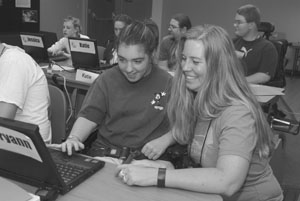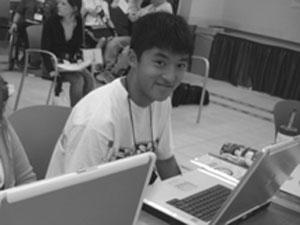Chapter 6: Work-Based Learning

Work-based learning experiences can help a student choose careers, network with potential employers, select courses of study, and develop job skills relevant to future employment. This chapter tells about DO-IT activities where, through the interaction of study and work experiences, students can enhance their academic knowledge, personal development, and professional preparation. It is adapted from earlier publications (Burgstahler 2001; Burgstahler & Bellman 2005; Burgstahler, Lopez, & Bellman, 2004; DO-IT, 2006d).
What DO-IT Offers Students With Disabilities
Specifically, work-based learning opportunities can help students:
- clarify academic and career interests
- gain academic credit
- apply practical theories from classroom work
- develop human relations skills through interaction with coworkers
- gain exposure to specialized facilities not available on campus
- develop job-search skills
- develop résumés and cover letters.
- dentify career assistance programs
- pay for education
- develop contacts for employment after graduation
Work-based learning activities begin during the Summer Study program and continue throughout the program involvement of DO-IT Scholars and Ambassadors. DO-IT staff and volunteers help students develop résumés, practice interviewing skills, conduct career searches, and learn about educational requirements for specific careers. Participants are also encouraged to access resources on DO-IT's AccessCAREERS website.
The following paragraphs describe other work-based learning activities facilitated through DO-IT (DO-IT, 2006d).
Throughout their high school and college years, DO-IT Scholars and Ambassadors work with DO-IT staff to locate work-based learning activities that complement their academic studies and prepare them for careers. DO-IT staff continually expand their network of employers and agencies to enhance their offerings to participants.
Informational Interview
In informational interviews, students meet with people working in fields of interest to ask questions about their particular occupations, qualification requirements, job duties, and companies. These interviews help participants gain insight into careers from the people who are in those fields.
Job Shadowing
In job shadows, participants visit businesses to observe the everyday functions of occupational areas of interest to them. Experiences vary in length of time from one hour to a full day, depending on the amount of time employers are available and the level of interest and availability of students. Job shadowing experiences offer opportunities for career exploration and provide a realistic view of the day-to-day activities of specific jobs.
Service Learning
Service learning programs offer participants opportunities to be concerned, informed, and productive citizens by providing community service in nonpaid, volunteer positions. These volunteer programs increase the relevancy of academic learning as students gain and apply knowledge and skills while making a contribution to their local communities.
How Can Students Get Started?
Use DO-IT's CAREERS acronym:
C is for Careers. Think about what interests you. Be imaginative, then narrow down the list.
A is for Academics. Determine which academic programs best suit your career goals.
R is for Research. Research careers that spark your interests, maximize your strengths, and minimize your weaknesses.
EE is for Experiential Education. Practice job search skills. Participate in internships, service learning, cooperative education programs, or other work-based learning opportunities.
RS is for Relevant Skills. Use on-the-job experiences to learn practical "real world" skills. Apply what you've learned in school to the workplace. Test which accommodations work best for you.
Independent Study
Some schools allow participants to earn academic credit for work experiences. In an independent study option, students work one-to-one with a teacher or other educator to develop a work project for credit. Work experience coupled with assignments, such as a journal, essay, or presentation, give them opportunities to demonstrate and expand the skills they've learned in school.
Internship
An internship is an intensive learning experience that is not part of a regular class. Interns complete work in supervised learning situations with an employer. An internship can provide broad overviews of occupational fields and provide opportunities to experience work responsibilities and develop work skills. Some internships are paid; some are not paid. Some are on postsecondary campuses; some in industry; and some in nonprofit organizations.
What DO-IT Offers Employers
With assistive technology and reasonable accommodations, people with disabilities are often highly qualified to enter the workforce; yet they too often remain part of an underutilized labor pool. Internships and other work-based learning programs can give employers and coworkers a chance to experience working in a diverse environment and implement different worksite accommodations. DO-IT staff help employers:
- understand the potential contributions, legal rights, and needs of employees with disabilities
- find and secure work-based learning participants with strong qualifications
- learn about accommodations and assistive technologies that can increase productivity and independence of individuals with disabilities on the job
- gain assistance through on-site consultation to identify and obtain necessary job site accommodations for individuals with disabilities
What DO-IT Offers Educators

The number of students with disabilities entering and completing postsecondary education has increased dramatically in the last decade, yet people with disabilities are still underrepresented in the employment arena. Faculty members, counselors, and advisors can prepare students with disabilities to overcome barriers to employment by ensuring that academic and career programs are inclusive. DO-IT gives educators:
- information about various types of disabilities and accommodations
- an overview of new and expanding opportunities for students with disabilities in business, technology, engineering, science, and other challenging fields
- strategies to recruit and support students with disabilities in specific academic programs
- knowledge about assistive technologies and other accommodations that can help level the academic and work-site playing fields for people with disabilities
- an understanding of the importance and availability of work-based learning experiences for students with disabilities
What DO-IT Offers Families
Transitions within the academic setting and to a work setting are exciting, yet challenging, for both parents and their children. DO-IT helps improve the ability of family members to provide knowledgeable and effective support during these transitions. Utilizing DO-IT's resources parents can:
- learn about new and expanding opportunities for students with disabilities in business and technology fields
- learn about assistive technologies and other accommodations that can help level the academic and work-site playing fields
- understand the importance and availability of work-based learning experiences
- understand the availability of Social Security and other government programs
- understand their role in helping their children grow up to be independent, self-advocating career professionals

Conclusion
Work-based learning experiences, such as job shadows and internships, offer Scholars opportunities to practice skills and to network with potential employers. Work-based learning experiences also give Scholars a chance to determine if they can perform the essential functions of particular jobs. They provide opportunities to practice disclosing disabilities and requesting accommodations from an employer. In addition, participants develop self-advocacy skills and can test which accommodations work best for them through work-based learning. It's a great way to get off to a running start on their career paths!
Sample Documents
Consult the following Appendices for samples of forms that can be used in pre-internship interviews and to evaluate work-based learning experiences.
The next chapter shares lessons learned from the DO-IT Scholars program.